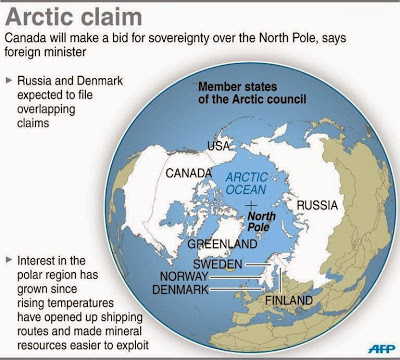Canadian Foreign Minister John Baird made a statement last week that revealed that a scientific and geographical survey regarding its claim to Arctic territories will be submitted to the UN Commission on the Limits of the Continental Shelf and may contain data robust enough to lay claim to the North Pole. The submission is necessitated by Canada’s participation in the UN Convention on the Law of Sea (UNCLOS). The move represents a bold political push by Stephen Harper’s conservative government to extend Canada’s rights in the Arctic.
Under the UN Convention on the Law of the Sea, a country can secure control of ocean floor beyond the internationally recognized 200-nautical-mile limit if it can demonstrate the seabed is an extension of its continental shelf.
Owing to a backlog at the UN commission it will be several years before Canada’s claim is scrutinized – a delay that gives Ottawa time to flesh out the bid for Arctic seabed rights.
To support a stake that lays claim as far as the North Pole, Canada would have to establish that underwater mountain ridges including the Lomonosov Ridge are linked to Canada’s continental shelf.
“Our submissions set out the potential outer limits of our Continental Shelf in the Atlantic Ocean including extensive areas in the Labrador Sea, the Grand Banks and off the province of Nova Scotia. In all, we’re talking about an area of about 1.2 million square kilometres,” Mr. Baird said. “That’s roughly the size of Alberta and Saskatchewan combined.”
The Arctic seabed is expected to contain over one-quarter of the world’s undiscovered energy resources. The U.S. Geological Survey provides more specific numbers: the Arctic may contain 13 percent of the world’s undiscovered oil reserves, 30 percent of undiscovered gas deposits, and 20 percent of the undiscovered natural gas liquids.
Following the Canadian announcement Putin “told his defense chiefs to concentrate on building up infrastructure and military units in the Arctic.” As fellow Flashpoints contributor J. Michael Cole reported, Russia’s military will prioritize its activities in Arctic in 2014.
If you liked this article, please give it a quick review on ycombinator or StumbleUpon. Thanks

Brian Wang is a Futurist Thought Leader and a popular Science blogger with 1 million readers per month. His blog Nextbigfuture.com is ranked #1 Science News Blog. It covers many disruptive technology and trends including Space, Robotics, Artificial Intelligence, Medicine, Anti-aging Biotechnology, and Nanotechnology.
Known for identifying cutting edge technologies, he is currently a Co-Founder of a startup and fundraiser for high potential early-stage companies. He is the Head of Research for Allocations for deep technology investments and an Angel Investor at Space Angels.
A frequent speaker at corporations, he has been a TEDx speaker, a Singularity University speaker and guest at numerous interviews for radio and podcasts. He is open to public speaking and advising engagements.


